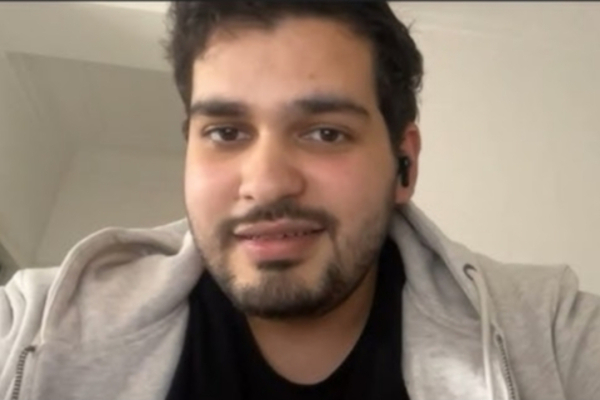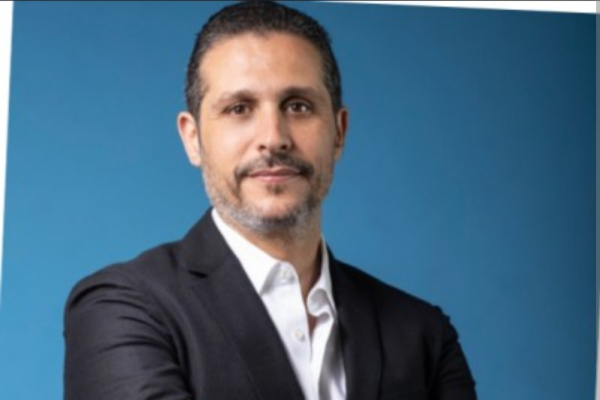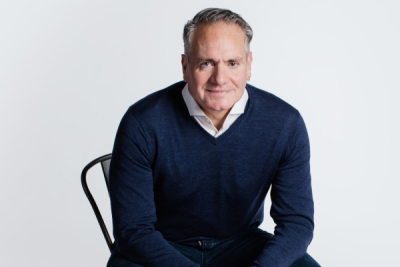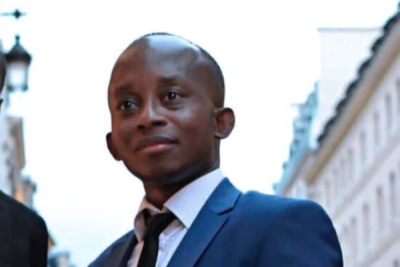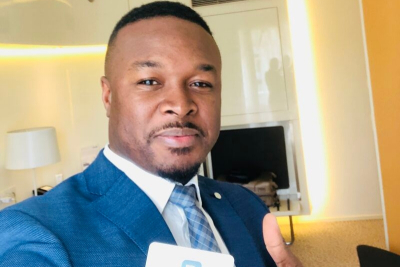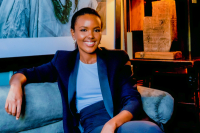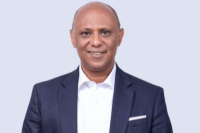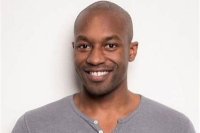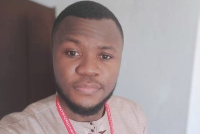
TECH STARS (1006)
With several years of experience in the Algerian hospitality sector, he aims to help both tourists and his fellow citizens efficiently plan their trips.
Mohamed Abdelhadi Mezi (photo) is an Algerian entrepreneur, co-founder, and CEO of Volz, a tech startup specializing in online airline ticket sales. Founded in 2022, Volz provides a platform for purchasing plane tickets with various payment options, including credit cards and cash on delivery. The platform offers a wide range of airlines and flight options at varying prices, making travel planning more accessible for users.
In addition to its core services, Volz is developing fintech solutions to ensure its services are accessible across all economic levels. Its features include price freezes, transparent refunds via its Refund by VOLZ function, price tracking, and a “book now, pay later” option, catering to a broad spectrum of customers.
Mezi is also the co-founder and CEO of Hotelris, another startup established in 2022. Hotelris assists hotels and travel agencies in developing long-term digital marketing strategies aimed at generating revenue, enhancing brand visibility online, and converting leads into clients.
He holds a bachelor’s degree in hospitality management from the National Higher School of Tourism of Algeria and studied digital marketing fundamentals at The Open University Business School in 2020.
His career began at KT Hotel in Algeria, where he worked as a restaurant manager and front desk agent. In 2018, he was appointed marketing director at Nreservi.com, an online travel agency. The following year, he joined Hyatt Regency Algiers Airport as a customer service associate.
In 2020, he joined Marriott International, where he served in various roles, including customer service associate, marketing specialist, and marketing manager for Algiers Marriott Hotel Bab Ezzouar and Residence Inn by Marriott Bab Ezzouar.
Melchior Koba
He aims to streamline Moroccan daily life by providing technological solutions that automate repetitive household chores, saving time and effort.
Majid Benslimane (photo) is a Moroccan digital innovation expert and entrepreneur. He is the founder and CEO of Presta Freedom, a platform offering subscription-based home services.
Founded in 2020, Presta Freedom connects Moroccan households with qualified cleaning agents through an intuitive web platform. Users can entrust their home cleaning to certified professionals, with services completed between 45 minutes and less than 3 hours, depending on the requirements.
Presta Freedom offers a wide range of services designed to simplify daily life, including laundry, gardening, pest control, repairs, handyman work, pet grooming, laundry pickup, pool maintenance, and grocery delivery. The company’s team of experts is equipped to meet the diverse needs of its clients.
Since 2009, Majid Benslimane has also served as Deputy General Manager at Uniforce Informatique, an IT solutions integrator. The company is part of the Medtech group, which includes several firms specializing in new technologies.
Benslimane holds an engineering degree in electronic and microelectronic engineering, which he earned in 2003 from the University of Moncton in Canada. He began his career the same year at Uniforce Informatique as Director of Development. In 2008, he joined the Young Leaders Center (CJD), where he participated in the commission on the Good Governance Code, leaving the center in 2012.
Melchior Koba
His aim is to simplify daily life for South Africans. A qualified accountant, he utilizes technology to provide financial solutions that cater to both individuals and businesses.
Andre Hugo (photo), a South African accountant and entrepreneur, is the co-founder and CEO of Spot Money, a fintech startup. Founded in 2019, Spot Money offers a comprehensive banking platform that empowers South Africans to manage their finances more effectively.
Founded in 2019, Spot Money offers a banking platform in South Africa that allows users to manage their finances more effectively, whether for saving, spending, or investing. The app combines payments, traditional banking services, rewards, alternative credit, and a marketplace for shopping, all within a single interface.
With Spot Money, users can scan any QR code to make payments. The app also provides loans and insurance through an open banking marketplace. Additionally, users can earn rewards in airtime or data when purchasing from Spot Money’s partners. The company, which does not charge account management fees, already boasts over 100,000 users.
Before launching Spot Money, Andre Hugo co-founded Money for Jam (M4JAM) in 2014, where he served as CEO until 2016. M4JAM delivers impartial, real-time data from actual consumers to brands, businesses, and organizations. The platform supports market research, mystery shopping, merchandising, product training, brand activations, as well as large-scale audit and compliance solutions that are faster and more cost-effective.
Andre Hugo holds two bachelor's degrees in accounting, auditing, and taxation, earned from the University of Cape Town in 1991 and the University of South Africa in 1993. In 1995, he became a Certified Information Systems Auditor. His career began in 1992 at P.A. Becker and Co., a German auditing firm, where he started as a trainee.
He later worked for major firms such as Deloitte between 1996 and 2013, holding various roles, including Director of Innovation, Marketing Director, and Head of Digital. From 2017 to 2020, he joined Virgin Money, a Scottish financial company, where he served as a strategic advisor and later as CEO.
Melchior Koba
His goal is to help parents better support their children in their studies. He also leads two startups specializing in educational technologies.
Nick Miller (photo), a South African mechatronics engineer and entrepreneur, is the founder and CEO of Teach Me 2, a tech startup specializing in youth learning.
Founded in 2006, Teach Me 2 is a South African tutoring startup that simplifies the process of finding and managing tutors, helping parents avoid the hassle of searching for teachers for their children. The platform automatically schedules sessions, offering the flexibility for students to receive tutoring at home or online. It provides tutors in a wide range of subjects, including accounting, chemistry, economics, mathematics, physics, statistics, French, history, and life coaching. Since its launch, more than 35,000 parents have trusted the company.
Miller is also the founder and CEO of Coachbit, a startup launched in 2019 that offers a scientifically-based life and learning coaching program with personalized content, specifically designed for preteens and teenagers.
Before these ventures, Miller co-founded Clickego in 2008, serving as CTO until 2012. Clickego specializes in online ad management. In 2011, he co-founded Rental Connect, a software engineering firm, and in 2014, he created Storie, a startup he led as CEO until 2016, which offered a mobile app for easily creating and sharing videos.
Miller holds a bachelor's degree in mechatronic engineering from the University of Cape Town, specializing in facial recognition, image processing, and signal processing, which he earned in 2007. From 2013 to 2016, he also worked as a content creator on YouTube.
Melchior Koba
Many Africans in the diaspora, eager to invest in construction projects in Africa, are deterred by scams and the difficulties of such ventures. To overcome these challenges, the IT specialist turned entrepreneur has created Wizodia.
Yao Attignon (photo), a Togolese IT specialist and entrepreneur, is the co-founder and CEO of Wizodia, a tech startup that simplifies real estate projects in Africa for diaspora members looking to build in their home countries.
Founded in 2017 by Attignon and Lionel Menzan, Wizodia offers a comprehensive platform that supports African emigrants throughout the entire construction process. The platform provides easy access to quotes, connects users with a network of reliable professionals, and allows them to track project progress in real time.
Through Wizodia, users can receive up-to-date information on their construction projects, with photos and videos captured by on-site teams, as well as access to all related documents. An internal messaging system allows for direct communication with project stakeholders. Today, the startup operates in Côte d'Ivoire, Togo, Benin, Cameroon, and Senegal.
Yao Attignon co-founded Wizodia to address the challenges emigrants face, particularly real estate scams, when trying to launch construction projects in their home countries. “I spent 10 years in IT consulting. During my career, being of Togolese origin, I wanted to invest back home. That’s when I discovered the obstacles faced by those looking to undertake real estate projects in Africa,” explains the entrepreneur.
Attignon graduated from the Institut Supérieur d’Informatique Appliquée (INSIA Paris) in 2006 with a degree in computer engineering. Before venturing into entrepreneurship, he worked (from 2011 to 2014) as a SAP consultant at ALiA Consulting, a business process management software company. Between 2016 and 2018, he was a project manager and SAP consultant at SEIZE Consulting, another IT services firm.
Melchior Koba
He has over 15 years of experience in the fintech sector. His goal is to create innovative and secure solutions tailored to the needs of professionals and individuals in Africa.
Moussa Dembele (photo) is a Malian computer scientist and entrepreneur, co-founder and CEO of Danapay, a fintech startup focused on improving access to international payments for Africans. Based in France, Danapay was founded in 2017 by Keita Gaoussou, Moussa, and Demba Dembele. The company leverages blockchain technology to simplify financial transactions between African businesses and individuals and the rest of the world. Additionally, it enables transactions via USSD and SMS.
Danapay allows individuals to transfer up to €6,000, while businesses can transfer up to €30,000, with the option to increase this limit to €70,000 by providing the necessary documentation. Africans residing in Europe can send money to 12 countries in West and Central Africa.
Moussa Dembele holds a degree in computer engineering from Polytech Marseille, which he earned in 2008, and a master's degree in organizational consulting from EM Lyon Business School, obtained in 2013.
His professional career began in 2009 at Société Générale Corporate and Investment Banking as a software engineer. In 2011, he joined AXA Investment Managers as an IT architect. By 2013, he became an information systems consultant at Sentelis, a consulting firm specializing in strategy, governance, and IT architecture. From 2018 to 2020, he worked as an IT consultant at CGI in Luxembourg, a company known for its technology services and business process management.
Melchior Koba
Her goal is to provide every African with access to quality insurance tailored to their respective needs. Through technology, she helps insurance companies better understand their customers' expectations.
Jihan Abass (photo) is a Kenyan entrepreneur and businesswoman. She is the founder and CEO of Lami Insurance Technology, a startup aiming to revolutionize insurance and make it accessible to everyone.
Founded in 2018, Lami Insurance Technology offers an insurance-as-a-service platform that digitizes the entire insurance value chain. This platform allows users to quickly create and distribute digital insurance products. Its services cater to a wide range of clients, including individuals, independent agents, and small to medium-sized enterprises (SMEs).
Before launching Lami, Jihan Abass founded Griffin Motor Assurance in 2016, one of East Africa’s first smart car insurance companies. The Griffin Motor app is redefining auto insurance in Africa, providing a simpler, more affordable, and efficient experience through innovation.
The Kenyan entrepreneur holds a bachelor’s degree in Investment and Financial Risk Management from Bayes Business School in London, England. She also graduated from the University of Oxford in 2019 with a master’s in Business Administration.
Prior to her entrepreneurial ventures, she worked as a trader at Toyota Tsusho Sugar Trading Limited, a company specializing in wholesale confectionery distribution. In 2022, The New Africa magazine ranked her among the 110 most influential African women.
Melchior Koba
After completing his studies and gaining several years of experience in the United States, he returned to Africa to use his technological expertise to benefit local populations. Through his recruitment platforms, he aims to reduce unemployment across the continent.
Yusuf Reja (photo) is an Ethiopian software engineer and serial entrepreneur. He is the founder and CEO of Africa Jobs Network, an interactive talent search platform.
Founded in 2019, Africa Jobs Network specializes in recruitment and employer branding, aiming to strengthen connections between local talent and companies across Africa. Based in Kenya, the company operates several platforms in various African countries.
The first platform, Ethiojobs.net, was launched by Yusuf Reja in 1997. It is one of Ethiopia's earliest job portals, helping job seekers confidently find opportunities. Another initiative, Deraja, also based in Ethiopia, focuses on tackling youth unemployment through innovative solutions aimed at improving their socio-economic well-being.
In addition, Yusuf Reja launched Kipawa, based in Nairobi, Kenya, in 2016. This branch of Africa Jobs Network specializes in recruitment marketing, offering effective employer branding solutions.
Yusuf Reja holds a bachelor's degree in computer and electrical engineering, which he earned in 1991 from the Santa Barbara College of Engineering at the University of California, U.S. His professional career began the same year at Motorola in Texas, where he worked as a software engineer. In 1994, he became the executive director of the Tigray Development Association in North America, a nonprofit dedicated to improving education in rural areas of Tigray, Ethiopia, a role he held until 1997.
Melchior Koba
Africa's gaming industry has over 200 million active players, and this young entrepreneur is a key figure in that industry. Born in Sierra Leone, he is now based in South Africa.
Cordel Robbin-Coker (photo) is a tech entrepreneur from Sierra Leone. He is the co-founder and CEO of Carry1st, a mobile gaming and digital commerce platform. Founded in 2018, Carry1st is headquartered in South Africa and focuses on publishing mobile games and digital content. The company has launched several popular games across Africa, including Africa Glam, Mancala Adventures, Ludo Blitz Naija, and Mine Rescue.
Africa Glam is a fashion and makeover game aimed at girls, while Mancala Adventures offers a digital version of the classic African board game, Mancala. Mine Rescue is a mining-themed game, and Ludo Blitz Naija is a mobile adaptation of the widely popular African board game, Ludo.
Carry1st has also formed partnerships with major gaming companies such as Activision, Supercell, and Riot Games, enabling them to distribute large-scale titles like Call of Duty: Mobile and Valorant across Africa. To fuel further game development and publishing, the company raised $20 million in 2022 and $27 million in 2023. In January 2024, Carry1st secured an undisclosed investment from Japanese multinational Sony, through its venture capital arm.
“At Carry1st, we believe the African console market is a widely underestimated opportunity. Our unique regional capabilities, combined with Sony's gaming and entertainment expertise, make for a winning combination. Together, we hope to offer the best games in the world to players across Africa,” said Robbin-Coker, CEO of Carry1st.
Beyond Carry1st, Robbin-Coker serves on the boards of the Milton Hershey School and The Hershey Company, a global food and beverage corporation. He holds a Bachelor’s degree in political science from Stanford University.
His career began in 2008 at Morgan Stanley, where he worked as an investment banking analyst. In 2011, he joined the private equity firm The Carlyle Group, holding various roles, including Associate for U.S. Opportunities Fund and Vice President for the Sub-Saharan Africa Fund.
Melchior Koba
After earning a degree in law and taxation, he embarked on an entrepreneurial journey. Leveraging information and communication technologies (ICT), he now provides last-mile delivery services in Togo.
Ruphin Tiou Tagba Aliti (photo) is a Togolese lawyer and entrepreneur in the ICT sector. He is the co-founder and CEO of Kaba Delivery, a start-up specializing in delivery solutions.
Founded in 2018, Kaba Delivery simplifies daily deliveries through a dedicated mobile app. The platform allows users to order meals on-demand from a wide range of restaurants. Customers can pay in cash upon delivery or via electronic methods like credit cards or mobile money. The app also uses geolocation to enable users to accurately specify their location. To foster customer loyalty, Kaba Delivery rewards each order with points. After 50 orders, customers can enjoy a 3,000 CFA Francs (around $5) discount on delivery fees every month.
Today, Kaba Delivery has over 200 partners and employs more than 50 delivery personnel. The start-up has completed over 150,000 deliveries, generating a total transaction value of 250 million CFA Francs.
In addition to his entrepreneurial pursuits, Ruphin Tiou Tagba Aliti teaches e-commerce at the Ecole supérieure du commerce et de l’économie numérique (ESCEN) in Togo. He holds a bachelor's degree in business law from Jean-François Champollion University in Toulouse, France, which he obtained in 2015, and a master’s in tax consulting and expertise from the Institut supérieur de management in Dakar, Senegal, completed in 2018.
Melchior Koba
More...
Mohamed Achraf Mrabet Simplifies Healthy EatingA computer engineer, he uses his skills to serve the Tunisian population. Committed to the well-being of his fellow citizens, he developed a meal-planning system to promote healthy eating habits.
Mohamed Achraf Mrabet (photo) is a Tunisian computer scientist and entrepreneur. He is the founder and CEO of Ukla, a food tech startup established in 2022. Ukla is a meal-planning application that offers a variety of features to help users organize their weekly meals, access nutritional advice, and easily prepare new recipes with detailed, step-by-step instructions. Once meals are planned, the app automatically generates a shopping list of necessary ingredients, simplifying grocery shopping for users.
Ukla’s mission is to make healthy eating both accessible and enjoyable for everyone. "We are passionate about helping people take control of their nutrition to achieve fitness goals and improve overall well-being. With Ukla, you can avoid junk food and eliminate the mental effort of thinking about recipes, portions, and diets," Mrabet writes on his LinkedIn profile.
Mrabet graduated in 2023 with a degree in computer engineering from Tunisia’s École Supérieure Privée d'Ingénierie et de Technologie (ESPRIT). To gain experience, he completed an internship in 2021 at TSF Innovations, a software development company, where he worked as a web developer. Between 2021 and 2022, he also served as project manager for Engineers Spack Esprit, a student club that promotes innovation and creativity among students.
Melchior Koba
With a marketing degree, he gained experience working for several telecommunications companies. As an entrepreneur, he has developed technology to help Egyptians realize their dream of owning a home.
Mostafa El-Beltagy, an Egyptian marketing expert and entrepreneur, is the co-founder and CEO of Nawy, a digital real estate startup founded in 2019.
Nawy emerged from the collaboration of El-Beltagy, Abdel-Azim Osman, Aly Rafea, Ahmed Rafea, and Mohamed Abou Ghanima. The company offers a variety of services, including real estate brokerage and financing, allowing families to move into their dream homes immediately with payment plans of up to 10 years.
The company provides a comprehensive platform that simplifies the experience for real estate buyers, sellers, and investors. It positions itself as "a technology-based information and service hub, with multiple branches handling every step of our clients' journey, from finding a home to buying, selling, consulting, or investing in real estate, all on a fully immersive digital platform."
Before founding Nawy, El-Beltagy co-founded Bey2ollak, a multi-platform mobile app that enables users to exchange real-time traffic information.
Mostafa El-Beltagy holds a bachelor’s degree in marketing from the American University in Cairo. His professional career began in 2008 at Nielsen, an international performance management company, where he worked as a research analyst. In 2009, he joined Vodafone Egypt as head of prepaid services.
He went on to work for several other telecom operators. In 2013, he became the general manager of prepaid business at Vodacom. In 2014, El-Beltagy returned to Vodafone, where he oversaw customer value management, pricing, and commercial strategy for both consumer and business segments. From 2017 to 2021, he held roles as head of marketing and chief commercial officer.
Melchior Koba
An entrepreneur and business leader, he runs several companies. His most recent venture is a digital startup that promotes the consumption of local meals in South Africa.
Talifhani Banks (photo) is a trained statistician and South African entrepreneur. He founded Spaza Eats, a startup launched in 2020 that specializes in delivery services. The company offers a platform for delivering food, groceries, and local products, with a unique focus on traditional South African meals and the digitization of informal markets, thereby promoting financial inclusion and access to banking services. The platform emphasizes local suppliers and traditional cuisine.
In addition to Spaza Eats, Talifhani Banks is the CEO of AnalyticsX, a tech company that provides a full suite of services, including software development, data engineering, data science, Internet of Things (IoT), system testing, and systems analysis. With operations in South Africa, Botswana, and Dubai, AnalyticsX delivers innovative solutions to help businesses thrive in an increasingly digital environment. The company is also a tech investor, supporting promising startups by providing the necessary funding and resources for growth and success.
Talifhani Banks graduated from the University of Pretoria, where he studied statistics and econometrics from 2009 to 2012. He began his professional career in 2013 at Daymon, a business services and consulting firm, working as a private label analyst. In 2015, he joined Pick n Pay, a retail startup, as a pricing and promotions analyst. By 2017, he was a business analyst at AutoZone South Africa, an automotive company.
In 2022, Talifhani Banks was recognized for his achievements, receiving several awards, including South Africa's Entrepreneur of the Year and Tech CEO of the Year. He also won the BRICS International Award of the Year.
Melchior Koba
The lack of timely agricultural information has long impacted farmers' productivity and income. To address this issue, she developed an information system based on artificial intelligence.
Cassandra Mtine (photo) is a Zambian entrepreneur, co-founder, and CEO of AgriPredict. Founded in 2016, this agri-tech startup helps small-scale farmers access on-demand agricultural information.
Based in Lusaka, Zambia, AgriPredict uses artificial intelligence and machine learning to provide farmers with weather data such as rainfall forecasts, temperature trends, and humidity levels. Accessible via USSD and a mobile app, this information helps farmers better plan their activities.
“Our AI-based weather app is more than just a tool; it's a bridge between cutting-edge technology and traditional farming practices. We believe that by putting this power into the hands of farmers, we're contributing to a more food-secure future,” said Cassandra Mtine in August 2024.
AgriPredict also offers an early warning system that alerts users to potential threats like severe weather, diseases, or pest infestations. Additionally, the startup has developed an online marketplace that facilitates the buying and selling of products, connecting farmers with buyers, sellers, and agricultural traders.
Cassandra Mtine graduated from the University of Arizona in the United States, where she earned a bachelor’s degree in environmental economics and natural resources in 2004, followed by a master’s degree in public policy and administration in 2007. She began her professional career in 2008 at the Critical Path Institute, a nonprofit focused on drug development, where she served as an associate project manager.
From 2012 to 2017, she was CEO of Shopzed Investments, an online grocery delivery service. In 2013, she also worked as a consultant for the Centre for Environment Justice, an organization advocating for the fundamental right to a healthy environment and access to accurate environmental information.
Melchior Koba


